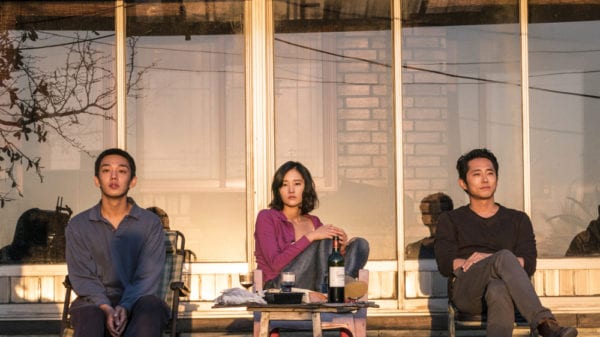Burning, 2018.
Written and directed by Lee Chang-dong.
Starring Yoo Ah-in, Jeon Jong-seo and Steven Yeun.
SYNOPSIS:
A humble farmer is hurt when the girl he loves returns from a trip to Africa with an attractive and slightly suspicious new partner. When she goes missing, he is keen to investigate.
Burning arrives in UK cinemas with a fair amount of expectation behind it. It was a festival favourite and became the first South Korean movie to crack the shortlist for the Best Foreign Language Film award at the Oscars, although it didn’t manage to land a nomination. Thankfully, Lee Chang-dong’s film is equal to the majority of that pressure. It’s a patient and enthralling mystery thriller about male jealousy that hits hard, even as it fails to make all of its pieces fit together.
Yoo Ah-in’s protagonist Jong-su is the archetypal ‘beta’ male, so it’s a surprise to both he and the audience when he finds himself on a date with old school acquaintance Hae-mi (Jeon Jong-seo) and subsequently in her bed. Their sex scene is awkward beyond belief, holding on Jong-su’s slightly bewildered face as he fixates on the wall, the closet, the window and just about anything other than the task at hand. Almost immediately, she’s off to Africa and enlists him to feed her cat – a creature which never appears when he’s in the apartment.
 Several weeks later, she comes back. However, when an excited Jong-su arrives at the airport, it becomes clear that Hae-mi has returned with a friend in the shape of Steven Yeun’s charming Ben. He’s everything that Jong-su is not – handsome, wealthy and completely comfortable in his own skin. Given his suggestion that he has “never shed a tear in my life”, he’s almost a cartoonish embodiment of macho, alpha male cool. The first half of Burning is effectively a love triangle, in which Jong-su frequently comes up short against Ben – played with infuriating smugness by Yeun, delivering another brilliant performance after almost stealing Sorry to Bother You last year.
Several weeks later, she comes back. However, when an excited Jong-su arrives at the airport, it becomes clear that Hae-mi has returned with a friend in the shape of Steven Yeun’s charming Ben. He’s everything that Jong-su is not – handsome, wealthy and completely comfortable in his own skin. Given his suggestion that he has “never shed a tear in my life”, he’s almost a cartoonish embodiment of macho, alpha male cool. The first half of Burning is effectively a love triangle, in which Jong-su frequently comes up short against Ben – played with infuriating smugness by Yeun, delivering another brilliant performance after almost stealing Sorry to Bother You last year.
There’s a nagging sense under the surface of these early scenes that Hae-mi is being pushed aside by the non-verbal war between the two men. She’s a troubled woman, who claims she wants to “just vanish like I never existed”. Indeed, after a serene sequence in which she dances topless in the glow of a sunset, she disappears without a trace. Jong-su is certain that Ben is to blame and turns amateur sleuth, following the thread of Hae-mi’s most recent steps, as well as examining Ben’s bizarre admission that he enjoys lighting greenhouses on fire. A dream sequence in which Jong-su hallucinates a boy smiling in the flickering light of an inferno is an evocative portrait of the protagonist’s obsession with Ben.
Burning segues effortlessly from intriguing love triangle drama into an engrossing mystery thriller for its second half. Ah-In’s performance becomes more frantic, while Mowg’s score expands into a huge, stark array of noises. Jong-su’s suspicion, and that of the audience, immediately falls to Yeun’s smug city boy, but Jong-seo’s performance has more than enough Gone Girl in it that there’s always that nagging sense of doubt surrounding the nature of her vanishing.
Chang-dong’s patient storytelling and mastery of tone ensures that Burning never loses its sense of momentum, even with a running time that knocks on the door of two and a half hours. Like any thriller narrative, there’s a question mark as to how well the mystery can be resolved, and Burning doesn’t entirely find a coherent way to tie everything together. There’s a lot to be said for ambiguity but, in a movie built on breadcrumb trails, it’s a shame that there isn’t a more satisfying resolution.
When Jong-su states, late in the movie, that “the world is a mystery”, he may as well be speaking for the audience – even after they leave the cinema.
Flickering Myth Rating – Film: ★ ★ ★ ★ / Movie: ★ ★ ★ ★
Tom Beasley is a freelance film journalist and wrestling fan. Follow him on Twitter via @TomJBeasley for movie opinions, wrestling stuff and puns.














